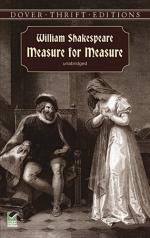|
This section contains 6,672 words (approx. 23 pages at 300 words per page) |

|
SOURCE: Korda, Natasha. “Isabella's Rule: Singlewomen and the Properties of Poverty in Measure for Measure.” In Shakespeare's Domestic Economies: Gender and Property in Early Modern England, pp. 159-91. Philadelphia: University of Pennsylvania Press, 2002.
In the following excerpt, Korda studies the precarious social position of the single woman—variously embodied as Isabella, Marianna, Juliet, and Mistress Overdone—in the patriarchal world of Measure for Measure.
Measure for Measure, … manifests a profound preoccupation with the place of singlewomen—many of whom had formerly lived in, around, and (in the case of those who were impoverished) by the good graces of the nunneries—in post-Reformation society. What was at stake in this preoccupation, I shall argue, was the threat that placeless singlewomen posed to an increasingly paternalistic state (one that had taken over, secularized, and centralized the task of provisioning the poor, which had formerly been presided over by the religious...
|
This section contains 6,672 words (approx. 23 pages at 300 words per page) |

|


